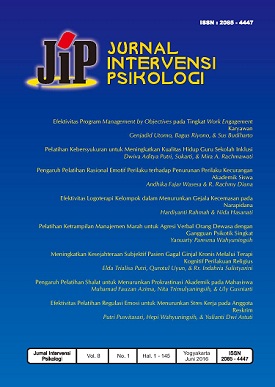Main Article Content
Abstract
As the purpose of this study was to investigate the effect of shalat's training to lower on student academic procrastination. The hypothesis is no effect of a decrease in academic procrastination among students who attend training shalat with students who are not trained to shalat. This study uses pretest and posttest control group design, in which the research subjects are students from various departments at "Y" University in Yogyakarta a total of 8 people, with 4 people in the experimental group and 4 people in the control group.This study uses a scale of academic procrastination compiled by Siswanto (2013). Data were analyzed using non-parametric statistics, the Wilcoxon sign rank test. The results of the research in the experimental group for differences pre and post test obtained value Z =-0.368, p = 0.713 (p>0.05). As for differences in pre-test and post-test in the control group, the value of Z = -l.826, p = 0.068 (p>0.05). It can be concluded that there is no difference in academic procrastination before and after the shalat's training. Thus, the research hypothesis was rejected.
Keywords: Academic Procrastination, Shalat's Training




